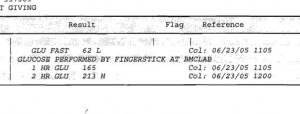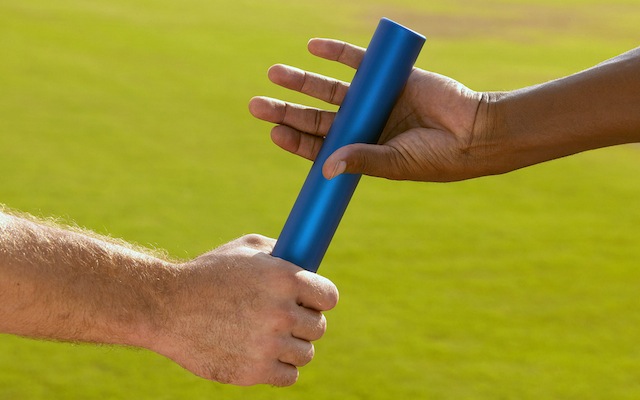GLUCOSE FASTING – 621-HOUR GLUCOSE – 1652-HOUR GLUCOSE – 213I failed the glucose tolerance test I took in June 2005. This alerted me that my body was in trouble.The purpose of a glucose tolerance test is to see how effectively your body tolerates a blast sugar. If your body doesn’t clear the excess sugar out of your blood quickly enough, you’re classified as a diabetic. Back then, I didn’t know much about the full range of tests that might give a comprehensive indication of what was going on. But at least I got the key “official” test. That’s what this is. It may not be the best test, or the most useful one. But at least, it is an official test. Here’s a larger example of how the lab test looked: |
GLUCOSE FASTING – 62
1-HOUR GLUCOSE – 165
2-HOUR GLUCOSE – 213
FASTING GLUCOSE means I didn’t eat anything for breakfast that morning, and I hadn’t eating anything past 7 PM the night before. I had drunk some water, but had no food . . . until the test began. Here’s how it happens. First, the lab did a finger prick with a glucometer. You might notice that my fasting blood sugar of 62 was marked as “Low.” Actually, if you’re insulin senstive, a blood sugar in the 60s can be normal, and in fact, healthy. I was feeling just fine, so I was not concerned about my sugars being 62. Neither was Ron Rosedale when I told him about this later. Neither was my endocrinologist, Christopher Fox, once I officially became one of his patients. So it’s puzzling to me that on a lab test, this kind of blood sugar gets marked as low. Go figure.
1-HOUR GLUCOSE was taken one hour after the sugar part of this tolerance test was underway. That means 1-hour after the lab had given me a cup of supersweet sugar water to chug on down. I think 75 mg of sugar is standard. Imagine a cup of cold, fizzy Sprite, only three times sweeter than normal. Yuck.
After you drink that sugar water, you’re supposed to take it easy and come back in an hour for your 1-hour blood sugar draw. That means a needle poke in the inside of your elbow, for a tube of blood. After 1-hour, my blood sugars had climbed over 100 points. That indicates “Prediabetes” though it was not yet considered “officially” too high.
The final tube of blood was taken at 2 hours, and the procedure was the same as before. It’s considered a normal result if the sugars are down below 140 by the end of 2 hours. It’s “impaired glucose tolerance” if it’s above 140 but below 200. Above 200 makes you officially diabetic. Though to be sure, you’re supposed to retry the test on another date, and see what happens. You have to fail two of these tests to be deemed a truly “real” diabetic. So, a few months later, I took a second test . . .







Hi, Emily,
The reason I first took a glucose tolerance test is that I was helping with a community nutrition class and . . . We’d seen great results with lots of people finding a low-carb, high fat, adequate protein diet worked well for them and led to improvements in bloodwork and reduction in medication needs. Then a diabetic educator from a nearby metro clinic brought a glucometer to the group, for the diabetics to use, and she put in a fresh lancet for each person, so each person could get a sense of their blood sugars. I had never used that strange device, a glucometer, and when it was my turn, I was a little surprised, because most people had blood sugars in the 70s and 80s. One diabetic who was trying to be low carb but had been to McDonalds and had french fries two hours earlier laughed and blushed and said, “Busted” because her blood sugars were in the 150s to 180s. I had eaten some meat and carrots for lunch that day . . . and my blood sugars were 120. That got me thinking, and wondering. The diabetes educator let us keep a couple of glucometers and the supplies for using them, and in between the weekly classes, I had them in the back of my car.
A few weeks after this, I had a radio interview to prerecord with an acupuncturist who was from mainland China. He was a fiery and opinionated guy, and after doing the interview, he introduced me to his 84 year old mom, and said that in honor of me interviewing him, he was taking me and his mother out to lunch. We had encountered several cultural mismatches during the interview (he had almost thrown me out when I didn’t arrive with a calling card, and so I had to go on line and show him my name and different journalism pieces of mine on the internet, to prove I was legit), so I decided to oblige him (and was intrigued and charmed by the offer), so I went to lunch with him and his mom. Since she spoke Mandarin and I don’t, I put a lot of time into drawing pictures for her on a piece of paper – like a rooster, a horse, and so on, and asking her the names for these in Mandarin. Her son, the acupuncturist, had taken us to a Thai restaurant and ordered everything for us – that means Thai tea, Thai vegetables, Thai rice. This was nearly 10 years ago. I figured, what the heck! I’m healthy. I figured, I generally eat low carb, so I can surely handle something out of the ordinary now and then. So as I doodled the drawings for his mom, I also ate a good amount of all that carb-loaded food, including drinking the very sweet Thai tea.
I happened to have one of the glucometers from the diabetes educator still in the back of my car, and it was over an hour after the luncheon, so I figured I would just do a quick test of my blood sugars, out of curiosity. They were somewhere around 180 or 190. That didn’t seem good. And they stayed up there for awhile. That didn’t seem good either.
I did some reading on the internet and figured I should check this out more formally, so that I could decide whether I was “sort of” doing a low carb diet just in the spirit of a healthy person doing this kind of thing for the principle of it, or because in my particular case, it might be a very, very good idea.
It was a shock back in 2005 or so to find out I failed a real glucose tolerance test. I sort of expected it, based on what had happened in my casual use of a glucometer. But there’s a difference between suspecting and finding out. It was even more conclusive when the endocrinologist was doubtful that someone of “healthy body weight” and no other symptoms could be diabetic, and asked for a 2nd test. That 2nd test was to make sure the first wasn’t a fluke. As for the information I got, it’s thanks to Ron Rosedale that I went ahead and ordered insulins to be drawn as well. Ron basically said, “if you’re going to do that nasty test and stress your body, at least also get your insulins checked.” Insulins showed my pancreas couldn’t pump out more than 3 units of insulin throughout the test, even as my blood sugars went above 200. I was actually horrified. When the results came back to the endocrinologist, he said, very gently, that my pancreas was going to be burning out because it was already red-lining. I asked in a scared, hopeful voice, “But, if I take care of my pancreas and don’t stress it with carbs, do you suppose it will get better?” He replied, with genuine sympathy, “That would be nice.” But I could tell he didn’t think it would be at all likely.
Anyhow, I really did luck out, and probably through this series of serendipities, got alerted that my pancreas was in trouble before it was totally burned out. It leads me to think that it might not be a bad idea for more people to get this kind of testing done (you can do it on line these days. That’s how I did some of this, purchasing the tests through direct lab services, for instance. In other cases, I asked a doctor to help me out, or the doctor asked for these tests). My guess is that catching this kind of condition earlier gives more chance of slowing down or reversing damage.
Shelley, I’m curious what alerted you that you should take a glucose test in the first place. Had you experienced symptoms that caused you to go to the doctor and request this lab work?